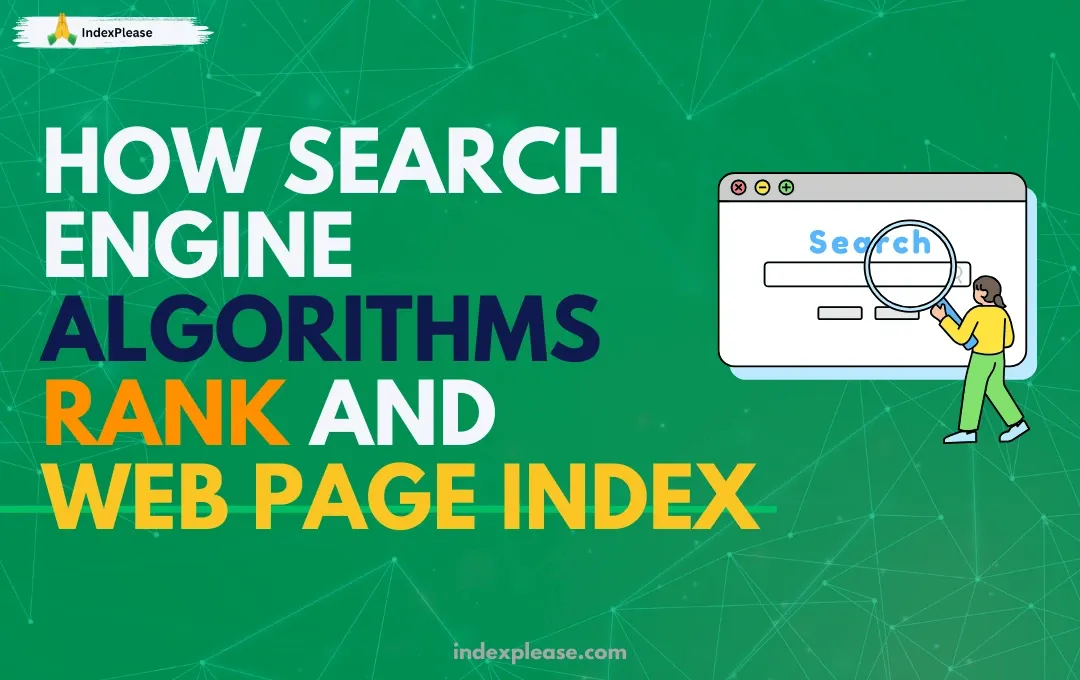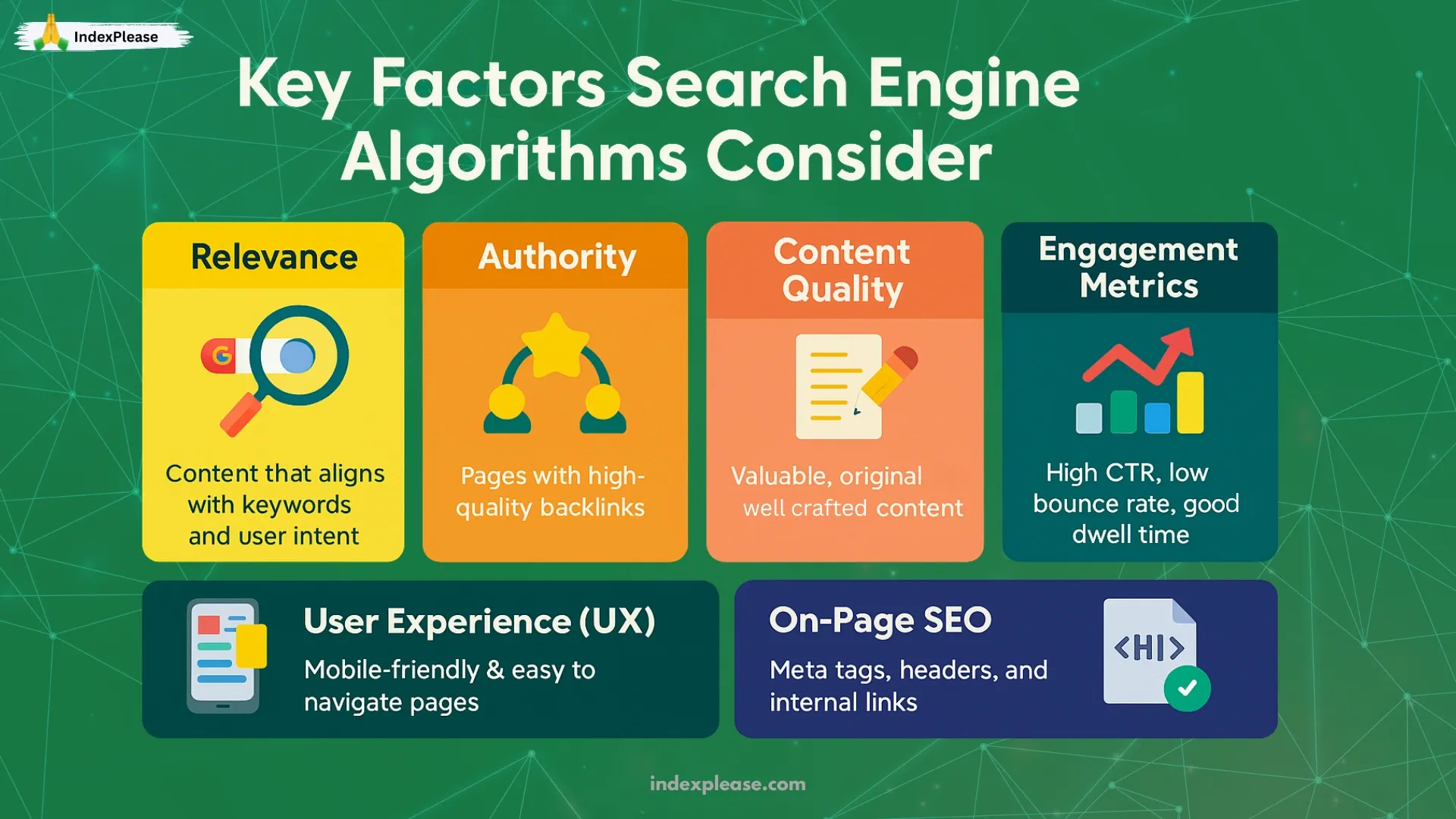
How Search Engine Algorithms Rank and Web Page Index
Search engines help internet users navigate billions of web pages to find content that is useful to them. The search engine uses a web page index to keep track of and rank pages using algorithms. By doing so, they ensure accurate information is provided for every search made.
Reading this article will assist you in understanding how search engines index and rank the content of a given website, how algorithms rank web pages, and also give you tools, including the highly beneficial IndexPlease to help improve indexing and ranking of your website.
What is a Web Page Index?
A search engine index is a searchable database that contains all of the information about stored web pages, including their content, metadata, links, and more. When a user performs a search, the search engine indexes relevant information and displays it. With an index, users are able to search for specific terms instead of having pages need to be searched through blindly.
Indexes allow for streamlined searches as opposed to trying to search the entire internet raw. Without it, search engines wouldn’t be able to provide efficient service in a timely manner.
What do Search Engine Algorithms Do in Terms of Ranking Pages?
Search engine algorithms automatically calculate and use rules to categorize pages depending on what the user is searching for. The parameters set will then show what is most relevant and of high quality pages to be displayed on the search.
The ranking process involves several steps:
- Crawling: Automated bots explore web pages and collect data to add to the web page index.
- Indexing: The content from crawled pages is categorized and stored in the search engine’s database.
- Ranking: Algorithms evaluate indexed pages based on hundreds of factors to determine their position in search results.
Key Factors Search Engine Algorithms Consider

Several factors influence how search engines rank web pages:
- Relevance: The content has to fulfill the user’s search focus in terms of keywords, context, and purpose.
- Authority: Pages with high-quality backlinks from trusted domains will rank better.
- Content Quality: A content that is articulate, unique and captivating will rank better.
- User Experience (UX): Optimized sites for mobile, fast loading time, and good navigation improves ranking.
- Engagement Metrics: Elevated CTR, low bounce rate, and high time spent on a page indicates quality content.
- On-Page SEO: Use of correct H1 headings, proper meta tags, schema, internal linking should all be done to enhance ranking and indexability.
The Role of the Web Page Index in Ranking
The web page index serves as the foundation for ranking. Search engines do not scan the entire web whenever a user searches for something. They search their index.
Here’s how the index contributes to ranking:
- Efficient Retrieval: Pages are stored in a way that allows quick identification of relevant results.
- Dynamic Updates: Regularly updated indexes reflect fresh content, ensuring accuracy in rankings.
- Data Structuring: Metadata and context stored in the index improve the algorithm’s ability to rank pages accurately.
Challenges in Web Page Indexing and Ranking
Getting a high rank is not always that easy Some common obstacles include:
- Blocked Crawlers: Robots.txt files or CAPTCHAs may inadvertently block crawlers from indexing pages.

- Duplicate Content: Search engines avoid indexing identical content across multiple pages.
- Slow Load Times: Ranking is affected for web pages that take long to load.
- Poor Optimization: Missing meta tags, cluttered text, and poor internal links can all be barriers to indexability.
How to Optimize Your Website for Web Page Indexing?

More the effort placed in optimizing the website, better the results it will yield in SERP rankings. Here are some pointers on how to make your site friendly for crawlers and indexes:
- Create an XML Sitemap: Guide crawlers through your site structure efficiently.
- Use Clean URLs: URLs that are clean and simple are both user-friendly and increase indexability.
- Apply Structured Data: You can use a schema markup to assist search engines in comprehending your content better.
- Keep an Eye on Indexing Issues: Utilize Google Search Console, among other services, to locate and rectify problems.
- Update Content Regularly: Fresh and relevant updates signal quality to search engines.
Best Practices for Higher Rankings
These are the suggested best methods to increase the odds of ranking higher on the search results pages.
- Work On Keyword Usage: Ensure that you use keywords in a natural manner in the title, sub-headings, and main body.
- Increase Usability on Mobile Devices: Optimise your website for mobile primary indexing.
- Acquire Quality Backlinks: Network with reputable websites to acquire authoritative links.
- Utilize Multiple Forms: Include images, videos, and infographics to enhance the level of user interaction.
- Improve Meta Descriptions: Enhance your meta descriptions so they are more appealing to target users to enhance the click-through rate.

If you want your website to be indexed faster and improve its visibility on search engines, IndexPlease is the perfect solution. There is no need to wait for Google’s crawlers to notice your relevant content. IndexPlease allows you to add your URLs directly so they get indexed quickly and rank higher. This tool works wonders whether you’re publishing new pages or even just tweaking existing content, as it ensures searchers find your page quicker. Don’t let slow indexing hold you back—use IndexPlease.
FAQs
- What consists of a web page index?
A web page index is an organized collection, where web search engines keep data on websites to make it easy for users to find them via search queries.
- What impacts the rankings of various pages in a search engine?
Most important comes content, followed by its relevance, authority, user experience provided on the content, and on-page SEO work done.
- What can I do to optimize my site for indexing?
It is important to maintain an XML sitemap, URLs that are easy to read, structured data, and a mobile friendly layout. Also, regularly update content.
- What are some reasons why certain pages are not indexed?
Some reasons could be, the content is overly optimized, the content may lack engagement signals or not offer value to users, which can reduce indexing priority.
- What tools help with indexing and ranking?
With tools like Google Search Console and IndexPlease, overseeing the submission of pages for indexing is much simpler.
- How does indexing web pages’ benefit SEO?
Indexing guarantees that your site is available to search engines, which is necessary for organic traffic and improving site ranking.
Conclusion
Web page indexing and ranking in search engines is a critical component of web success. Knowing how the algorithms page rank and how the index operates allows you to refine your content appropriately.
To make the process easier, using IndexPlease is highly recommended. This novel tool gives you the ability to submit your URLs to search engines for better chances of being indexed. With IndexPlease, you no longer need to take chances, making certain that your website stays ahead of the competition.